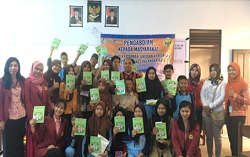Pendidikan Kesehatan Reproduksi Remaja dengan Media Pemanfaatan Buku Rapor Kesehatanku Adolescent Reproductive Health Education with Media Using My Health Report Book
Main Article Content
Abstract
Adolescence is a sensitive development or critical period for normative and maladaptive development patterns. Reproductive health is an essential issue for adolescents because every phase of adolescent development has developmental tasks that must be fulfilled. Implementing the activity is a combination of health education and peer group discussion using my health report book as the media. The results of community service activities were four teenagers (20%) who were at the level of knowledge both before being given health education and peer group discussions with my health report book media and after being shown an increase of 17 teenagers (85%). Then as many as seven teenagers (35%) were at the level of sufficient knowledge before being given health education and peer group discussion with my health report book media. After being offered only three teenagers (15%) who were at the level of sufficient knowledge. At the level of lack of knowledge before being given counseling and peer group discussion with my health report book media as many as nine teenagers (45%) at level of lack of knowledge and after being given, there were no teenagers at the level of lack of knowledge so it can be concluded that the combination of health education and peer group discussion with media My health report card is an alternative choice in increasing adolescent knowledge about reproductive health.
Downloads
Article Details
Authors who publish with this journal agree to the following terms:
- Any article on the copyright is retained by the author(s).
- Author grant the journal, right of first publication with the work simultaneously licensed under a Creative Commons Attribution License that allows others to share work with acknowledgment of the work authors and initial publications in this journal.
- Authors are able to enter into a separate, additional contractual arrangements for non-exclusive distribution of published articles of work (eg, post-institutional repository) or publish it in a book, with acknowledgment of its initial publication in this journal.
- Authors are permitted and encouraged to post their work online (e.g., in institutional repositories or on their websites) prior to and during the submission process, as can lead to productive exchanges, as well as earlier and greater citation of published work.
- The article and any associated published material is distributed under the Creative Commons Attribution-ShareAlike 4.0 International License
References
Aghaebrahimiya, N., Mirshahjafari, E. 2018. Comparison of Group Discussion and Lecture on the Social Skills of High School Students in Chemistry for the Academic Year 93-92. International Journal of Academic Research in Progressive Education and Development. 3(4):225–236. https://doi.org/10.6007/IJARPED/v3-i4/1280
Borca, G., Bina, M., Keller, P.S., Gilbert, L.R., Begotti, T. 2015. Internet use and developmental tasks. Computers in Human Behavior. 52(C):49–58. https://doi.org/10.1016/j.chb.2015.05.029
Ibegbulam, I.J., Akpom, C.C., Enem, F.N., Onyam, D.I. 2018. Use of the Internet as a source for reproductive health information seeking among adolescent girls in secondary schools in Enugu, Nigeria. Health Information and Libraries Journal. 35(4):298-308. https://doi.org/10.1111/hir.12242
Kementerian Kesehatan Republik Indonesia. 2018a. Survei Demografi dan Kesehatan Indonesia: Kesehatan Reproduksi Remaja. Jakarta: Kementerian Kesehatan Republik Indonesia
Kementerian Kesehatan Republik Indonesia. 2018b. Petunjuk Teknis Penggunaan Buku Rapor Kesehatanku. Jakarta: Direktorat Jenderal Kesehatan Masyarakat Kementerian Kesehatan Republik Indonesia
Kementerian Kesehatan Republik Indonesia. 2013. Situasi Kesehatan Reproduksi Remaja. Jakarta: Kementerian Kesehatan Republik Indonesia
Kementerian Kesehatan Republik Indonesia. 2010. Pedoman Teknik Konseling Kesehatan Remaja bagi Konselor Sebaya. Jakarta: Direktorat Bina Kesehatan Anak Kementerian Kesehatan Republik Indonesia.
Kyilleh, J.M., Tabong, P.T.N., Konlaan, B.B. 2018. Adolescents’ reproductive health knowledge, choices and factors affecting reproductive health choices: A qualitative study in the West Gonja District in Northern region, Ghana. BMC International Health and Human Rights. 18(1):6. https://doi.org/10.1186/s12914-018-0147-5
Lansford, J.E., Banati, P. 2018. Handbook of Adolescent Development Research and Its Impact on Global Policy. Oxford, UK: Oxford University. https://www.unicef-irc.org/publications/987-handbook-of-adolescent-development-research-and-its-impact-on-global-policy.html
Laski, L. 2015. Realising the health and wellbeing of adolescents. BMJ. 351:h4119. https://doi.org/10.1136/bmj.h4119
Salam, R.A., Faqqah, A., Sajjad, N., Lassi, Z.S., Das, J.K., Kaufman, M., et al. 2016. Improving Adolescent Sexual and Reproductive Health: A Systematic Review of Potential Interventions. Journal of Adolescent Health. 59(4S):S11–S28. https://doi.org/10.1016/j.jadohealth.2016.05.022
Salmela-Aro, K. 2011. Stages of Adolescence. In Brown, B.B., Prinstein, M.J. (Eds.). Encyclopedia of Adolescence. Cambridge, MA: Academic Press. https://doi.org/10.1016/B978-0-12-373951-3.00043-0
Sander, B., Golas, M.M. 2013. HistoViewer: An Interactive E-learning Platform Facilitating Group and Peer Group Learning. Anatomical Sciences Education. 6(3):182-190. https://doi.org/10.1002/ase.1336
Shakour, M., Salehi, K., Yamani, N. 2018. Reproductive Health Need Assessment of Adolescent Boys and Girls during Puberty: A Qualitative Study. International Journal of Pediatrics. 6(9):8195–8205. https://doi.org/10.22038/ijp.2018.29648.2602
Solfema, S., Wahid, S. 2018. Peer Group Learning Method to Improve the College Student’s Achievement. Journal of Nonformal Education. 4(2):187–196. http://dx.doi.org/10.15294/jne.v4i2.16008
UNICEF. 2016. Strategy for Health 2016-2030. New York: UNICEF
Wang, M.J. 2011. Using multimodal presentation software and peer group discussion in learning English as a second language. Australasian Journal of Educational Technology. 27(6):907–923. https://doi.org/10.14742/ajet.920
Wang, M., Han, X., Fang, H., Xu, C., Lin, X., Xia, S., et al. 2018. Impact of Health Education on Knowledge and Behaviors toward Infectious Diseases among Students in Gansu Province, China. 2018. BioMed Research International. 2018:6397340. https://doi.org/10.1155/2018/6397340
Widyastari, D.A., Shaluhiyah, Z., Widjanarko, B. 2011. Urinating After Sexual Intercourse Prevents Pregnancy: Adolescents Misconception of Reproductive Health Knowledge. Jurnal Kesehatan Reproduksi. 1(2):102–112.
Williamson, B.S., Paulsen-Becejac, L. 2017. The Impact of Peer Learning within a Group of International Post-graduate Students – A Pilot Study. Athens Journal of Education. 5(1):7-27. http://dx.doi.org/10.30958/aje.5-1-1
World Health Organization. 2018. Orientation Programme on Adolescent Health for Health-care Providers: Handout for Module A: Introduction. Geneva: Department of Child and Adolescent Health and Development World Health Organization.
World Health Organization. 2012. Health education: theoretical concepts, effective strategies and core competencies. https://apps.who.int/iris/handle/10665/119953
